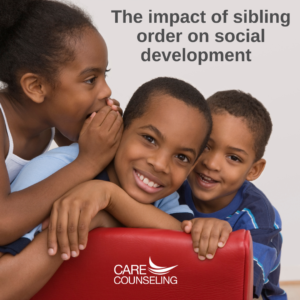The Impact of Sibling Order on Personality Development
 Siblings are an integral part of many people’s lives, shaping their childhood experiences and influencing their growth. While the relationship between siblings can be complex and ever-changing, one aspect that has long intrigued psychologists and researchers is how a child’s birth order, or their position among their siblings, can impact their personality development. In this article, we’ll delve into the fascinating world of birth order and explore the ways it can affect a person’s personality.
Siblings are an integral part of many people’s lives, shaping their childhood experiences and influencing their growth. While the relationship between siblings can be complex and ever-changing, one aspect that has long intrigued psychologists and researchers is how a child’s birth order, or their position among their siblings, can impact their personality development. In this article, we’ll delve into the fascinating world of birth order and explore the ways it can affect a person’s personality.
Firstborns: The Responsible Trailblazers
Firstborn children often find themselves in the position of being the eldest, the path-breakers in their family. As a result, they tend to be more conscientious, responsible, and achievement-oriented. They often take on the role of the “caretaker” or “leader” among their siblings, which can influence their development.
These characteristics are often attributed to the extra attention and expectations placed on the firstborn. Parents, usually more anxious and conscientious with their first child, may encourage them to excel in school and take on leadership roles. This early exposure to responsibility can lead to a strong work ethic and a desire to excel in various areas of life.
Middle Children: The Peacemakers and Diplomats
Middle children often find themselves navigating between the strong personality of the firstborn and the carefree nature of the youngest sibling. As a result, they tend to be skilled diplomats, peacemakers, and negotiators. They’ve learned the art of compromise and have a knack for diffusing conflicts.
Their role in the family dynamic often encourages middle children to develop empathy and social skills. They are great at seeing situations from multiple perspectives and tend to be more sociable and adaptive in social settings. This ability to mediate and empathize can be a valuable asset in both personal and professional relationships.
Youngest Children: The Free Spirits
Youngest children often enjoy a more relaxed environment with less parental pressure. As a result, they are often described as free spirits who are more creative, adventurous, and outgoing. Youngest children often seek attention and can be natural entertainers.
Growing up with older siblings who have already achieved certain milestones, youngest children might have a more carefree attitude, and this can contribute to their sense of humor and charm. While they may not feel the same pressure to excel as their older siblings, they often have a strong desire to stand out in their own unique way.
Only Children: The Independent Achievers
Only children, having no siblings to share the spotlight with, often develop strong independent personalities. They tend to be high achievers, self-reliant, and mature beyond their years. Growing up as the sole focus of their parents’ attention can contribute to a strong sense of self and self-confidence.
However, the lack of siblings can also lead to certain challenges. Only children may have to put extra effort into developing social skills, as they don’t have the same built-in companionship that siblings provide. Nonetheless, they often excel in academic and professional pursuits.
Gender, Age Spacing, and Other Factors
It’s important to note that birth order is just one piece of the puzzle in understanding personality development. Other factors, such as gender, age spacing between siblings, and family dynamics, can also play a significant role.
For instance, a middle child may have a different experience if the age gap between them and their older sibling is significant. Similarly, gender can influence the dynamics, with brothers often having different relationships and interactions than sisters.
Furthermore, family dynamics, parenting styles, and other life experiences can significantly mold a child’s personality. While birth order can provide a general framework, it doesn’t determine a person’s entire personality.
Adaptability and Growth
It’s important to remember that birth order is not a rigid predictor of personality. People are incredibly adaptable, and individual experiences can vary widely. While there may be general tendencies associated with birth order, they don’t set a strict path for development.
Moreover, as children grow and enter adulthood, their personalities can evolve and change based on experiences, personal choices, and the influence of friends and mentors. Birth order can provide valuable insights, but it’s just one piece of the complex puzzle of personality development.
The impact of sibling order on personality development is a fascinating area of study. Firstborns often develop strong leadership and responsibility skills, middle children become adept at conflict resolution and diplomacy, youngest children tend to be creative free spirits, and only children often become independent high achievers. However, it’s important to recognize that individual experiences can vary widely, and birth order is just one factor among many that shape our personalities.
Understanding the influence of birth order can be valuable for parents and individuals alike. It can provide insights into why we have certain personality traits and how we relate to our siblings and others. Ultimately, it’s the unique combination of factors in our lives that make us who we are, and the beauty of personality lies in its diversity and adaptability.



























